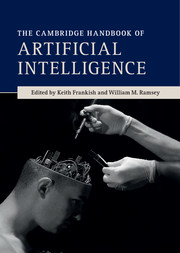15 - The ethics of artificial intelligence
Published online by Cambridge University Press: 05 July 2014
Summary
The possibility of creating thinking machines raises a host of ethical issues, related both to ensuring that such machines do not harm humans and other morally relevant beings, and to the moral status of the machines themselves. This chapter surveys some of the ethical challenges that may arise as we create artificial intelligences of various kinds and degrees.
Ethics in machine learning and other domain-specific AI algorithms
Imagine, in the near future, a bank using a machine learning algorithm to recommend mortgage applications for approval. A rejected applicant brings a lawsuit against the bank, alleging that the algorithm is discriminating racially against mortgage applicants. The bank replies that this is impossible, since the algorithm is deliberately blinded to the race of the applicants. Indeed, that was part of the bank’s rationale for implementing the system. Even so, statistics show that the bank’s approval rate for black applicants has been steadily dropping. Submitting ten apparently equally qualified genuine applicants (as determined by a separate panel of human judges) shows that the algorithm accepts white applicants and rejects black applicants. What could possibly be happening?
Keywords
- Type
- Chapter
- Information
- The Cambridge Handbook of Artificial Intelligence , pp. 316 - 334Publisher: Cambridge University PressPrint publication year: 2014
References
- 417
- Cited by

